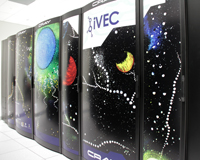'Galaxy' goes live at the iVEC Pawsey Centre
06 February 2014 The ASKAP Central Processor – also known as 'Galaxy', the RTC (real time computer) housed within the iVEC Pawsey Centre – has officially gone 'live', allowing the ASKAP team access to the supercomputer to support commissioning activities. With dedicated data processing software, known as ASKAPsoft, now installed at the Centre, the ASKAP commissioning team has been granted access to begin calibration and imaging of data being collected with ASKAP at the Murchison Radio-astronomy Observatory (MRO) in Western Australia. According to Ben Humphreys, ASKAP Science Data Processing Projects Leader, this achievement has depended on close collaboration with colleagues at iVEC and Cray. "Many thanks must go to our colleagues at iVEC and Cray for the hard work they have done over the past few months to get the final pieces in place to make this happen," he said. Significant activities coming up for ASKAP at the iVEC Pawsey Centre include:
The iVEC Pawsey supercomputing system is comprised of a number of integrated solutions including real-time compute and storage (provided by Cray), tape storage (HDS), a hierarchical storage management system and data analysis engines (both SGI). Supercomputing resources at iVEC's Pawsey Centre will also be available for data-intensive projects across the scientific spectrum, including biotechnology, geosciences and nanotechnology. Back to Latest ASKAP News page. |
This loads a font easier to read for people with dyslexia.
This renders the document in high contrast mode.
This renders the document as white on black
This can help those with trouble processing rapid screen movements.

